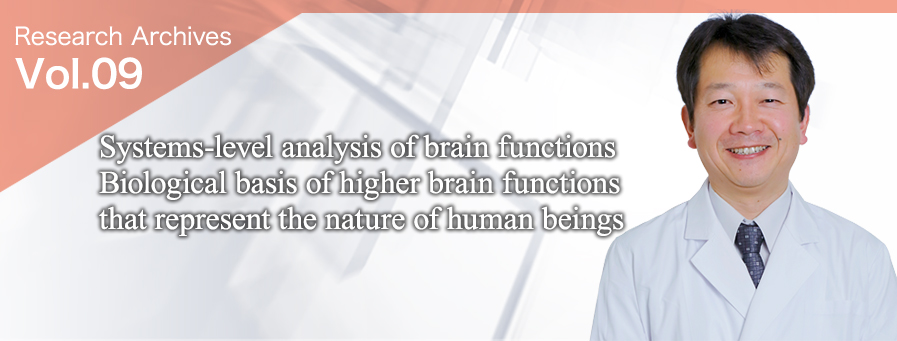
Systems Neuroscience Laboratory, Department of Physiology, Graduate School of Medicine, Hokkaido University
Masaki Tanaka, M.D., Ph.D.Physiological
Science
- 1994: Graduated from Hokkaido University School of Medicine.
- 1994-1998: PhD Student, Hokkaido University Graduate School of Medicine.
- 1998-2001: Research Associate, Howard Hughes Medical Institute at UCSF.
- 2002: Assistant Professor, 2007: Associate Professor, and 2010: Professor, Hokkaido University Graduate School of Medicine.
- 2006-2010: Concurrently served as a JST PRESTO Fellow.
- 2006: Won the Young Investigator Award, Japan Neuroscience Society.
- 2008: Won the Young Scientists' Prize, MEXT.
Neurophysiological approach to understanding the mechanisms of higher brain functions, such as time perception, selective attention, and movement decisions
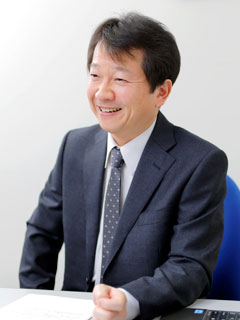
Neuroscience is increasingly attracting global interest, and major progress is expected to be made in the coming decades. Many questions such as: which part of the brain is related to a specific function, and what kinds of cells and molecules make up the brain, have already been answered; however, the underlying neural mechanisms of many brain functions remain elusive. The Laboratory of Systems Neuroscience, led by Prof. Masaki Tanaka, focuses on studying how individual neurons process information to generate our daily behavior and mental activities.
"Our lab studies the mechanisms of higher brain functions in non-human primates. We examine the activities of individual neurons in monkeys in order to understand how each brain area processes neuronal information for regulating behavior and perception. We also locally administer neuroactive drugs to ascertain the causal role of each brain region and molecules in behavior."
Of particular interest, a recent study by the laboratory related to time perception achieved significant findings.
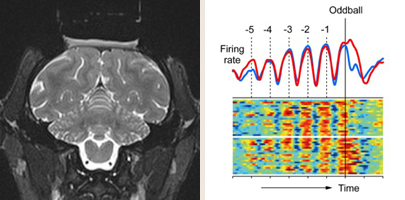
Right: Activity of a single neuron in the cerebellum. Response to each stimulus gradually increased.
"Because we do not have sensory organs that directly sense time, our perception of the passage of time and ability to feel a rhythm are created within the brain. It is believed that many parts of the brain, such as the cerebral cortex, cerebellum, basal ganglia, and thalamus, are involved in the perception of time, but its mechanism is, as yet, unknown. Recently, we carried out a study focused on the cerebellum."
In the experiments, a brief audiovisual stimulus was presented repetitively at a constant interval, and animals were trained to make an eye movement when a single stimulus in the sequence was omitted. The animals had to predict the timing of stimulus in order to detect an omitted stimulus. Using this 'missing oddball' paradigm, researchers at the laboratory were able to study neural activities related to the perception of rhythm in the cerebellum.
"Many neurons in the cerebellar nuclei exhibited a gradual elevation of the response gain. As we could observe a delay in behavioral response as a result of pharmacological inactivation of the recording sites, we conclude that the signals in the cerebellum are playing a causal role in predicting the timing of the subsequent stimulus. In separate experiments, we also found a similar delayed response in patients with cerebellar degeneration. Our data suggest that, when we feel a rhythm, neurons in the cerebellum are being activated."
Higher brain functions, such as perception of time, are also a topic in the fields of cognitive science, psychology, and philosophy. However, the Systems Neuroscience Laboratory always aims to explain these functions through research based on biological perspectives including activities of individual neurons, the architecture of local circuits, and the causal roles of functional molecules.
The only laboratory in Hokkaido conducting physiological experiments in non-human primates
The advancement of research in Systems Neuroscience contributes to medical science
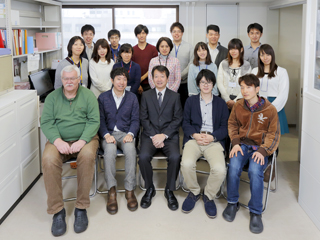 The Systems Neuroscience Laboratory attracts talents from a wide variety of fields in addition to medicine, such as biology, pharmacology, engineering, and psychology. Many graduates from the Hokkaido University School of Medicine join the Medical Scientist Training Program (MD-PhD Program) as part of their work toward becoming researchers in the fields of medical sciences and clinical medicine. Researchers in the laboratory may have different scientific interests but mutually corporate and work hard together in a free atmosphere.
In addition to time perception, the laboratory has made numerous findings concerning topics such as neural mechanisms of spatiotemporal attention, rule-based response selection, and visuospatial short-term memory.
The Systems Neuroscience Laboratory attracts talents from a wide variety of fields in addition to medicine, such as biology, pharmacology, engineering, and psychology. Many graduates from the Hokkaido University School of Medicine join the Medical Scientist Training Program (MD-PhD Program) as part of their work toward becoming researchers in the fields of medical sciences and clinical medicine. Researchers in the laboratory may have different scientific interests but mutually corporate and work hard together in a free atmosphere.
In addition to time perception, the laboratory has made numerous findings concerning topics such as neural mechanisms of spatiotemporal attention, rule-based response selection, and visuospatial short-term memory.
"In tandem with conventional electrophysiological and pharmacological experiments, we are planning to conduct new research projects such as transgenesis in monkeys, creation of a disease model by means of irradiation, and behavioral analysis of patients with cerebellar degeneration. Above all, we have a great interest in systems neuroscience experiments using molecular tools, because transgenesis technology using viral vectors is now developing very rapidly."
Currently, most transgenic experiments are conducted on rodents, but in the very near future, these technologies will be applied to research of higher brain functions in non-human primates. Introducing new technologies and young talents will increase future research activities in this field.
"Generally, any basic research at our Graduate School of Medicine can greatly contribute to clinical practice because its ultimate goal is to understand humans. As research on brain function in particular requires creativity, each researcher in the lab is asked to think independently and challenge a unique study full of originality. If you want to fulfill yourself through basic research, we can offer many opportunities where you can apply all your talents. We are waiting for you to get on board."
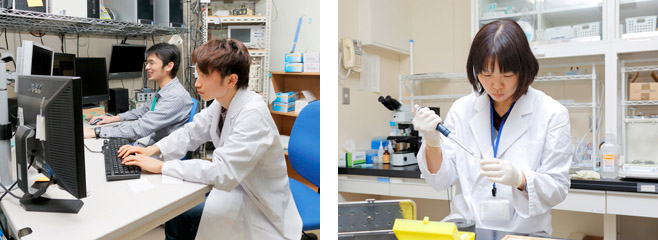
(Interviewed in February 2015)
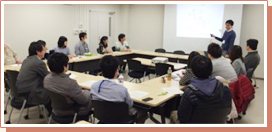
A journal club is held every Wednesday. All students and researchers are welcome to join us.


